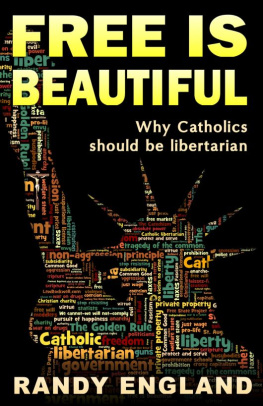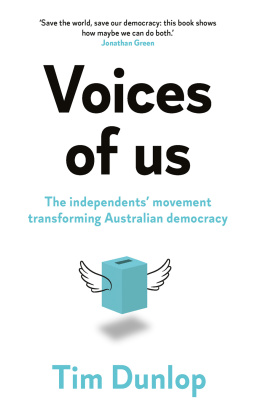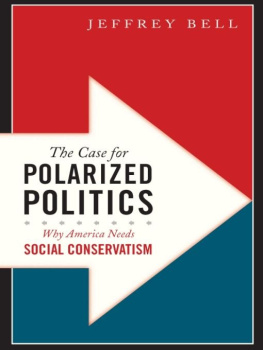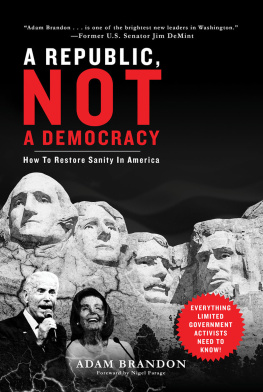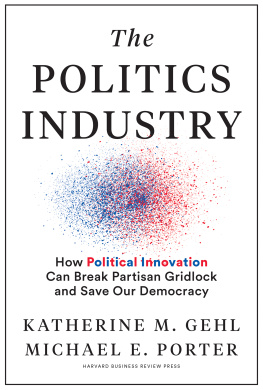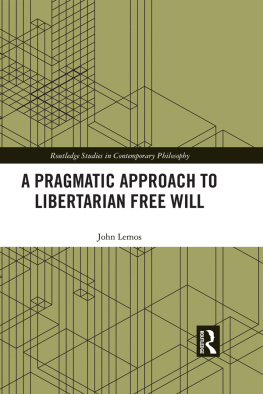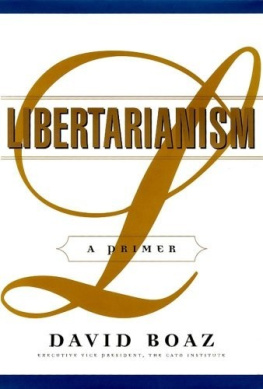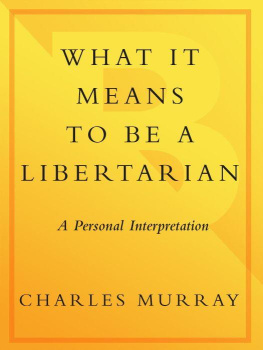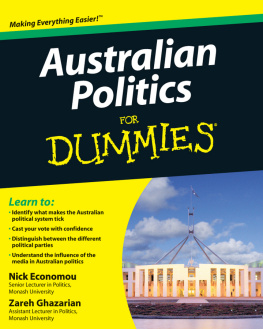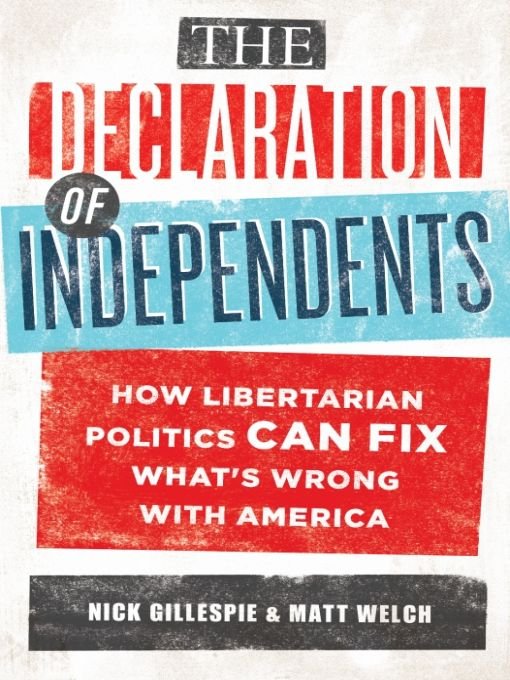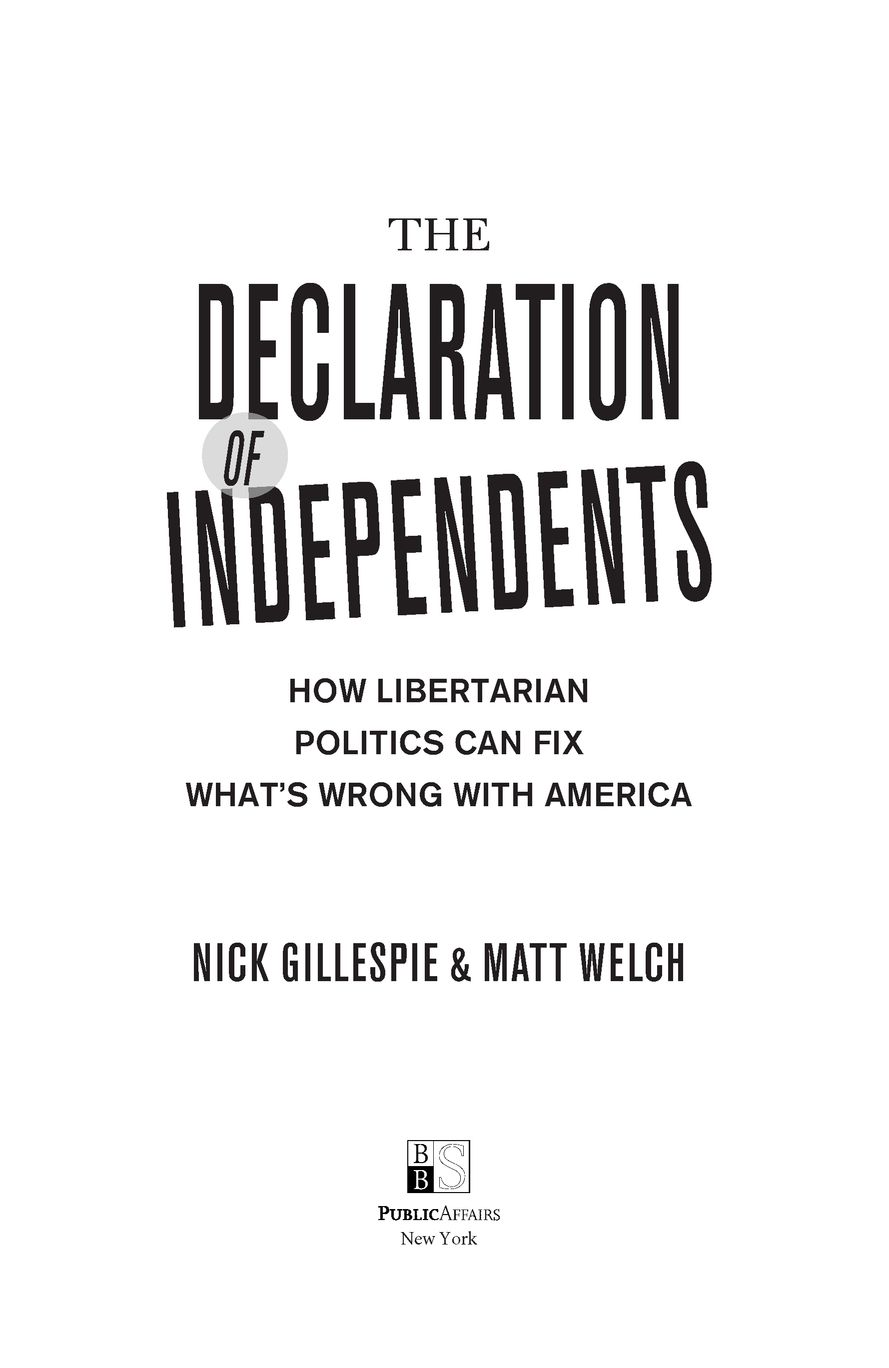Table of Contents
To IzidraMatt Welch
To Jack and NealNick Gillespie
PROLOGUE
PURSUING HAPPINESS, NOT POLITICS
When was the last time you read the Declaration of Independence? Go ahead and call it up; give it a quick scanwell wait. Focus less on the detailed bill of particulars against King George (He has called together legislative bodies at places unusual, uncomfortable, and distant!), disregard completely the bit about the merciless Indian savages, and concentrate instead on the two majestic, throat-clearing paragraphs at the top. Particularly this, the most influential English-language formulation of liberty, written during the 1700s: We hold these truths to be self-evident, that all men are created equal, that they are endowed by their Creator with certain unalienable rights, that among these are life, liberty and the pursuit of happiness.
You dont have to be one of those guys who dresses up in knee breeches and tricornered hats on the Fourth of July to feel, lo these many years later, the refreshing blast of radical Enlightenment thought contained within those three dozen words. Here is the source code not just for the revolutionary moment being heralded but for the very notion that individual rights precedeand therefore should be explicitly protected fromgovernment. Jefferson and the other signers based their righteous complaints of injustice on the foundational insight that we are all born not just naked but equal and free, laying more than the groundwork for the bloody business at hand. They created a self-replicating sequence that led to the assertion in 1848 by the radicals at Seneca Falls that women were part of the deal and the deliverance, as well as to what Martin Luther King called, nearly two centuries later, the promissory note of full civil rights for the descendants of Jeffersons slaves. The world would never be the same. And by enumerating three specific unalienables at the top of the dont-tread-on-me list, these eighteenth-century hotheads laid out some intellectual bread crumbs for those of us looking for a fresh way out of the desultory state of American affairs in this to-date-disappointing twenty-first century.
Note what Button Gwinnett, Cesar Rodney, Richard Stockton, and all the other signers did not include on the short list of worthy endeavors no government should thwart. The document says nothing about pursuing politics. It does not read, Life, liberty, and the watching of Meet the Press. No, the men chafing and gnawing at the crowns leash elevated above all other pursuits the quest for happiness, as defined by each individual, by his own lights. It was a declaration-within-the-Declaration that existential meaning derives neither from the whims of a sovereign nor from enlistment in some grand national project or even humble civic initiative but rather from the most atomized level of being: the personal, private, idiosyncratic human heart. Liberty was both a means and a destinationa process and a goal worthier than specific policy results. Happiness was aspirational; it was all about the journey, the pursuit.
In 2011, we do not equate happiness with politics; the mere juxtaposition of the words feels obscene. And for good reason: Politics, as John Adamss great-grandson Henry famously observed, has always been the systematic organization of hatreds. Every election cycleand we are always in an election cyclewe are urged to remember that deep down inside we really despise the opposing gang of crooks. We hate their elite (or Podunk) ways, their socialist (or fascist) economics, their reliance on shadowy billionaires with suspect agendas. In a world where mutual gains from trade have lifted a half billion people out of poverty in just the past half decade, politics is one of the last remaining zero-sum games of I win, you lose, where the victor gets to spend everyone elses money in ways that appall the vanquished, until they switch places again after the next election. We instinctively know that our tax dollars arent being spent efficiently; the proof is in the post office, or the permitting offices at city hall, or the neighborhood school. We roll our eyes when President Barack Obama announces a new national competitiveness initiative in his State of the Union address just five years after George W. Bush announced a new American Competitiveness Initiative in his, or when each and every president since Richard Milhous Nixon swears that this time were gonna kick that foreign-oil habit once and for all. And yet, the political status quo keeps steering the Winnebago of state further and further into the ditch.
A growing majority of us have responded to the stale theatrics of Republican and Democratic misgovernance by making a rational choice. We ignore politics most of the time and instead pursue happiness by falling in love, starting a home business, making mashups on You Tube, going back to school, bumming around Europe for a year or three, playing fantasy baseball, or tricking out our El Caminos. Through these pursuits we eventually find almost everything that is wonderful and transformative about our modern lives: the Internet, travel, popular (and unpopular) music, the spread of freedom and prosperity around the globe. The Declarations most famous pursuit has delivered specific outcomes that eighteenth-century minds could not have divined, though the insight was there all along: People acting peacefully, mostly left to their own devices and not empowered by the state to force others into servitude, will create riches far more meaningful and vast than the cramped business of tax-collecting, regulation-spewing, do-as-I-say-or-else governments.
As robust and infinitely varied as our private universes may be, however, they no longer provide a reliable refuge from the destructive force of politics. Today, there is only one real policy issue facing the country, and unfortunately it threatens each and every one of us, even (especially?) those of us not yet born: We are out of money. At least forty-eight of the fifty states are running shortfalls, many of them staggering. Cities, counties, and states are on the hook for an estimated half trillion dollars worth of pension promises for which they havent socked away any money. New Jersey cant build tunnels, California pays more in debt service than it does in funding its once-enviable universities, and the presidents home state of Illinois is in receivership. The U.S. budget situation is much worse than that of Greece, a country that has been wracked with violence and instability after bondholders refused to keep propping up its fiscal fantasyland. We are one sharp turn in international market sentiment away from a crisis none of us has ever lived through.
The president himself says were confronting an untenable fiscal situation; yet, in the face of a $1.5 trillion deficit and a decade-long spending binge that hiked federal outlays by 62 percent in real terms, he cannot screw up the courage to suggest more than $400 billion worth of spending cutsover the next ten years. Meanwhile, the allegedly limited-government Republicans refuse to get anywhere near a radical plan from Rep. Paul Ryan to balance the budget by 2063. It is a bizarre snapshot in time, in which sizable majorities think the government is doing too much and spending too much, where bailout-supporting Democrats and Republicans alike were bounced out of office in 2010 by a new Tea Party movement centered on cutting the size and scope of government, and where even Federal Reserve Chairman Ben Bernanke, nicknamed Helicopter Ben for his belief that showering down fiat currency will solve all economic woes, is saying, If current policy settings are maintained... the federal budget will be on an unsustainable path. Yet,


